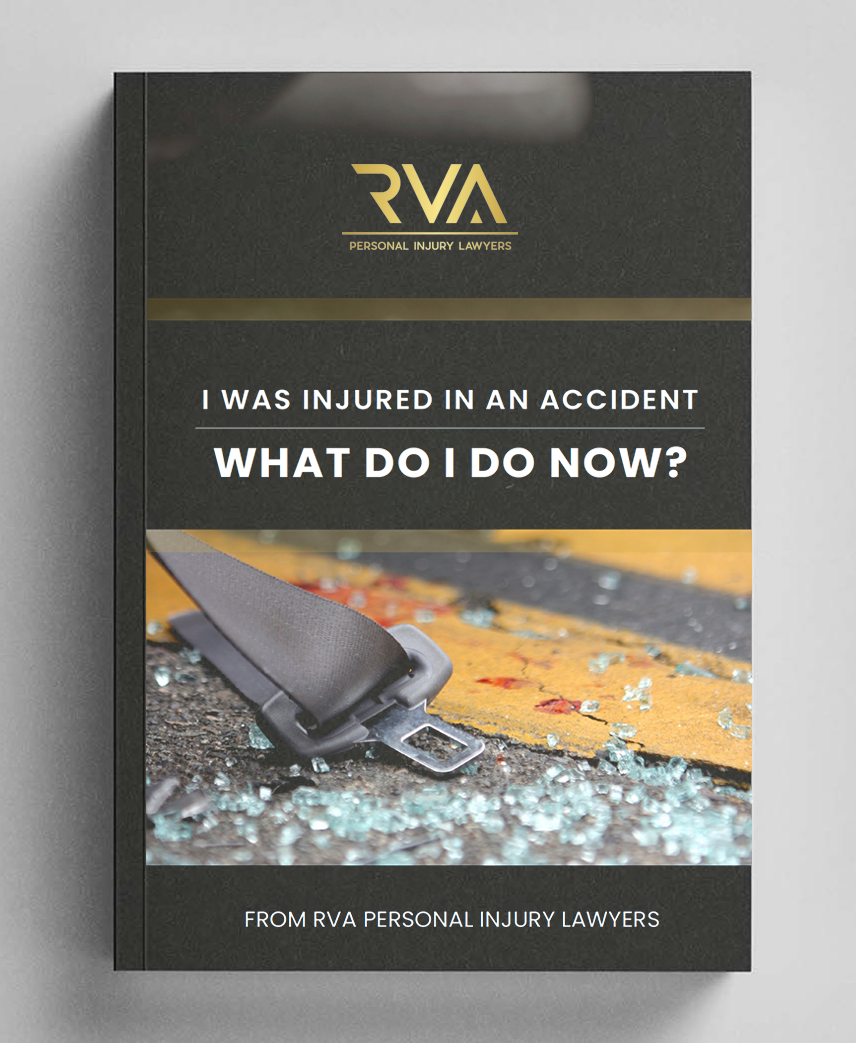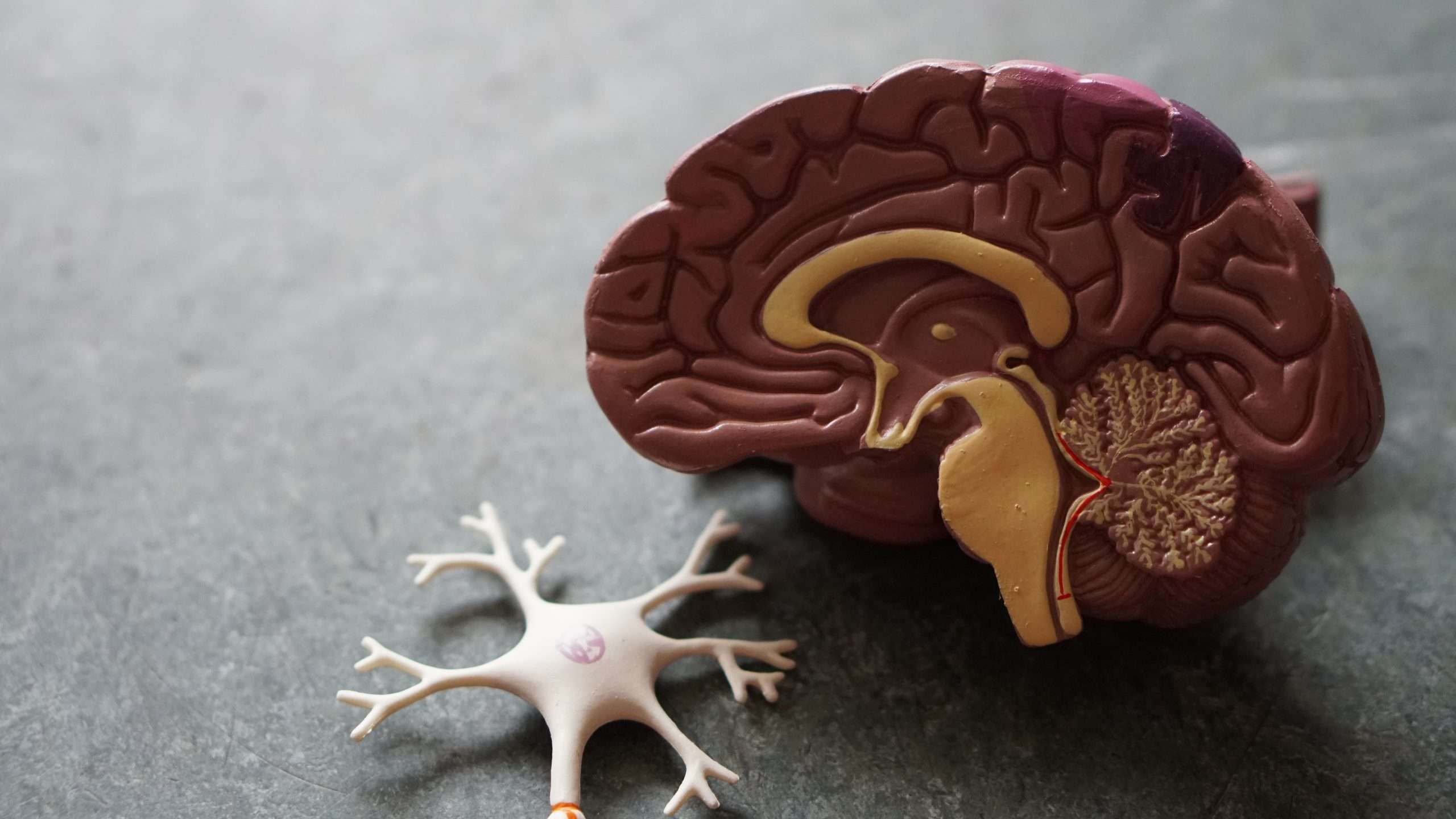
Virginia Traumatic Brain Injury Lawyer
Traumatic brain injuries (TBIs) can have a lasting and devastating impact on the people who suffer them and their loved ones. Navigating the ins and outs of such a life-altering event not only requires immediate medical attention, but also specialized legal representation from a Virginia brain injury lawyer you can trust.
That’s especially true if you think the TBI was the result of another person’s negligence, and you want to file a claim or pursue a traumatic brain injury lawsuit. Whether it’s a severe TBI caused by a motor vehicle accident, a mild concussion due to a slip and fall, or a head injury that’s caused by medical negligence – our brain injury law firm is here to fight for the compensation traumatic brain injury victims deserve.
If you have suffered injuries because of someone else’s negligence, Sharif Gray at Broughton Injury Law can help. We have won millions of dollars in verdicts and settlements. Call Sharif at (804) 915-1611, send him a message online, or schedule a free consultation with him. We will get justice for you.
Table of Contents
ToggleUnderstanding Traumatic Brain Injuries (TBIs)
Traumatic brain injuries are generally considered among the most serious types of injuries caused by accidents. For the most part, a TBI is caused when an external force, like a blow or sudden jolt to the head, disrupts the normal function of the brain.
These injuries can range from mild cases, like concussions, to much more severe conditions that can lead to permanent brain damage or even death. Regarding TBIs, there are three levels of severity. They include:
- Mild Traumatic Brain Injury
- Moderate Traumatic Brain Injury
- Severe Traumatic Brain Injury
The most common causes of these types of head injuries include slip and falls, motor vehicle crashes, and assaults – all of which can result in life-altering health problems.
Types of Traumatic Brain Injuries
Traumatic brain injuries (TBIs) not only vary greatly in terms of severity, but there are different types that can impact your health in many ways. Having an understanding of the different kinds of TBIs is both critical for brain injury lawyers and victims alike, as it helps to accurately assess the situation and pursue the best legal action.
A few of the most common types of TBIs encountered in personal injury cases, include:
- Concussions: From mild to severe concussions, this closed head injury can have a significant effect on your health. Generally, they’re caused by a sudden impact to the head that makes the brain shake inside the skull.
- Diffuse Axonal Injuries: These kinds of injuries involve tearing of the brain tissue because of a strong rotation or sudden shaking of the head – both which are common in high-speed car accidents.
- Cerebral Contusion: Very similar to a bruise, this type of condition is characterized by a localized bleeding in the brain, usually resulting from a direct impact to the head.
- Penetrating Brain Injuries: A traumatic brain injury caused when an object (e.g., sharp fragments, tools, falling debris, etc.) penetrates the skull, causing severe brain tissue damage.
From a diffuse axonal injury to a penetrating brain injury, each TBI variation presents unique short and long term challenges in terms of your health. This, among other reasons, is why your head injury lawyer must have the knowledge and experience to take a tailored approach in a traumatic brain injury claim or lawsuit.
In doing so, they’re able to develop a solid legal case while ensuring TBI victims get the support and compensation they need for their specific brain injury case.
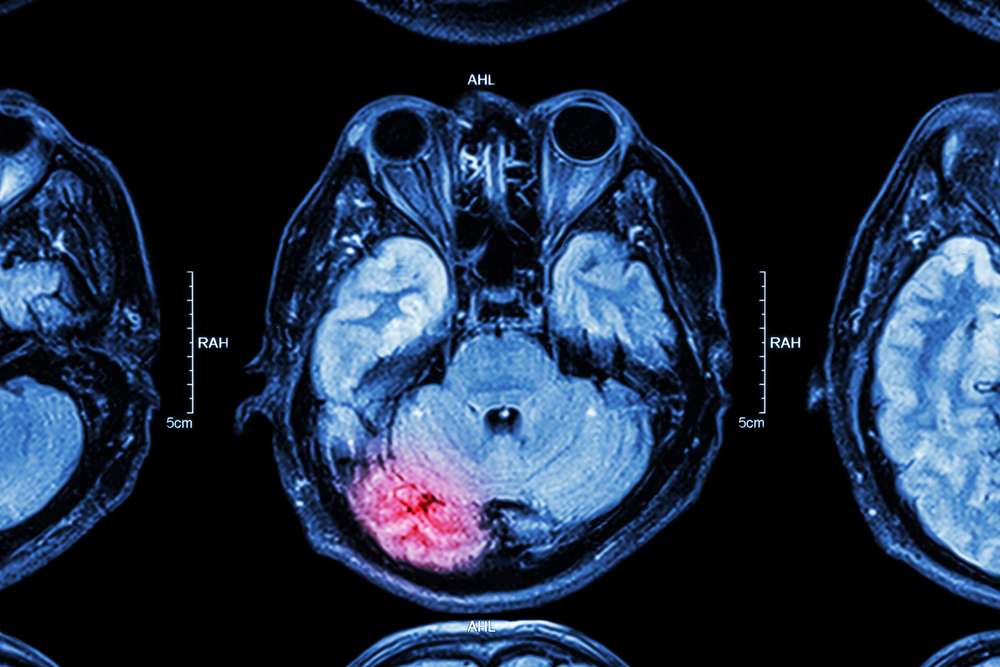
The Invisible Impact of TBIs
Sometimes called “invisible injuries,” the effects of TBIs aren’t always immediately clear. In fact, many of the symptoms are subtle and easily fly under the radar. They can include difficulty concentrating, emotional distress, and even problems with memory.
This “invisibility” can sometimes make it more challenging to seek compensation since the full extent of the injuries may not be initially apparent. This further underscores the need to seek immediate medical attention and to reach out to a brain injury lawyer soon after you’ve been involved in an event.
Prevalence and Statistics of TBIs in Virginia
According to the Centers for Disease Control and Prevention (CDC), there are nearly 70,000 TBI-related deaths in the U.S. every year, and millions more non-fatal TBIs. In many cases, these traumatic brain injuries result from an automobile accident, sports injury, slip and fall, or other types of incidents. Understanding the type, severity, and cause are critical when deciding on appropriate medical care and whether to pursue a traumatic brain injury claim with an insurance company.
Causes of Traumatic Brain Injuries
Traumatic brain injuries can occur under a multitude of circumstances. Therefore, it’s vital for traumatic brain injury lawyers to understand the diverse causes and potential outcomes. This knowledge isn’t just important for establishing negligence, but it also goes a long way when it comes to seeking justice for brain injury victims.
Vehicular Accidents and TBIs
Car accidents, often involving high-speed impacts, are a leading cause of TBIs and TBI-related deaths in the United States. The sudden jolt or collision can cause the brain to slam into the skull, leading to serious brain injuries.
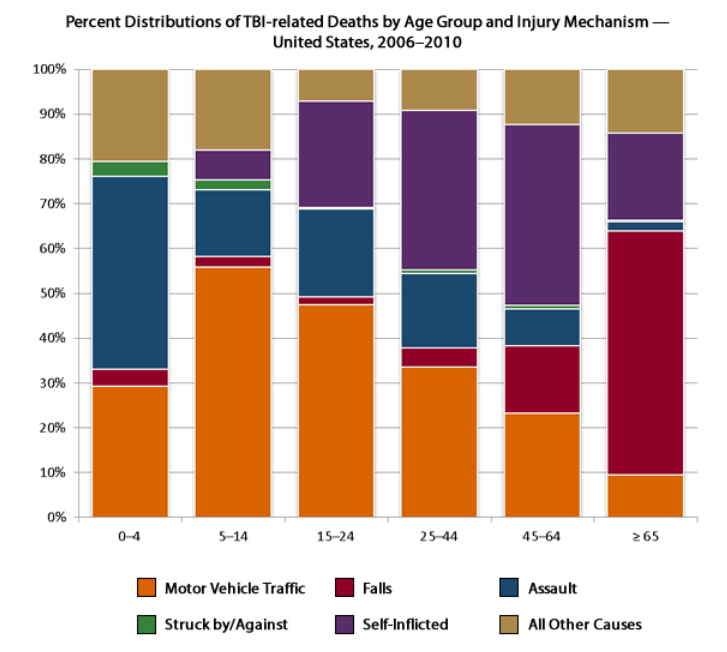
Source: https://www.cdc.gov/traumatic-brain-injury/index.html
Motor vehicle accidents, including those involving automobiles and motorcycles, demand a detail oriented investigation by a skilled brain injury attorney to help determine liability and recover compensation for the injured.
Slip and Fall Accidents Leading to TBIs
Slip and fall incidents, particularly among the elderly, can result in closed head injuries or more severe TBIs. Depending on the situation, a traumatic brain injury lawyer may have a tough time proving negligence in these kinds of cases, especially because Virginia has contributory negligence.
A common example of negligent behavior that can result in slip-and-fall TBIs is the failure to maintain safe premises, resulting in a victim falling, hitting their head, and suffering a severe injury.
Workplace-Related Brain Injuries
Traumatic brain injuries don’t just happen at home, they can occur anywhere, at any time. That includes the workplace, especially hazardous industries that involve heavy machinery, construction, or heights. In these types of TBI cases, a brain injury attorney needs to understand workers’ compensation laws, workplace safety protocols, and personal injury legislation.
Sports-Related Traumatic Brain Injuries
Sports, particularly contact sports like football or hockey, can (and usually do) result in TBIs, including concussions or more serious conditions like diffuse axonal injuries. Personal injury attorneys working on these cases may deal with issues surrounding the safety of the equipment, medical protocols, and negligence on behalf of the sports program.
Medical Malpractice and Brain Injuries
Brain injuries stemming from medical malpractice, like errors during surgery, can be particularly complex to uncover and litigate. In these instances, a brain injury law firm may need to delve deeper into intricate medical records and enlist the help of expert testimony to prove negligence and potentially recover damages for the person injured.
Each cause of TBI presents very unique legal challenges and usually requires the expertise of experienced traumatic brain injury attorneys to ensure that victims receive the best legal representation for their situation and compensation they deserve.
Legal Challenges in TBI Cases
Traumatic brain injury cases are among the most complex in personal injury law, presenting unique challenges for brain injury lawyers. The intricacies of these cases require a deep understanding of both the medical and legal aspects of TBIs.
Proving Liability in Brain Injury Cases
First and foremost, establishing liability is an incredibly critical component in a traumatic brain injury lawsuit. This involves proving negligence, whether it’s in a car accident, medical malpractice, or workplace incident.
Generally, your traumatic brain injury attorneys will need to gather solid evidence, including medical records, accident reports, and witness statements, to prove negligence and establish the cause of the brain injury.
Complexity of TBI Diagnosis and Proof
Diagnosing a TBI can be complicated, to say the least. That’s especially true when it comes to a mild traumatic brain injury or those hard-to-spot closed head injuries where symptoms might be less apparent.
Brain injury attorneys often rely on detailed medical examinations, expert testimonies, and advanced imaging techniques to demonstrate the extent of brain tissue damage and its massive impact on the brain injury victim’s life.
Long-Term Impact and Compensation Challenges
TBIs can have long-lasting effects on your physical health, emotional well-being, and ever-important cognitive abilities. This is why brain injury lawyers need to consider the following when attempting to recover compensation:
- The need for future medical treatment
- Cost of ongoing rehabilitation and perpetual medical bills
- Pain and suffering
- Lost wages
- And more
Generally, the aim is to ensure that the brain injury case accurately reflects the lifelong impact of the injury on the victim.
For the most part, navigating these legal challenges requires the expertise of a dedicated brain injury law firm, one that possesses the knowledge and resources to handle the multifaceted nature of traumatic brain injury cases.
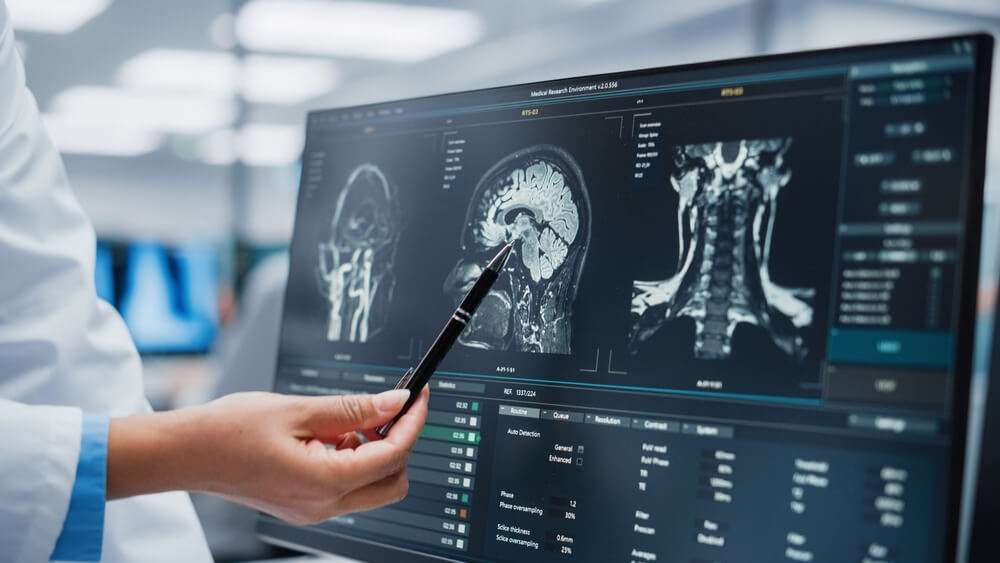
Compensation in TBI Cases
Most brain injury victims just want to be compensated fairly for the damages they’ve suffered as a result of another party’s negligence. This compensation should cover a host of damages experienced by the victim, including medical costs, pain and suffering, lost wages, and more.
Medical Expenses and Long-Term Care
According to the National Library of Medicine, in-hospital costs per TBI patient range between $2,130 to $401,808. Medical expenses might reach the higher end of the spectrum in cases of severe TBI, which include the costs for immediate medical attention, ongoing medical treatment, and potential long-term care. This can also extend to more specialized treatments like skull fracture surgery or even therapy for diffuse axonal injuries.
Lost Wages and Earning Capacity
Those who suffer traumatic brain injury know that it can significantly impact their ability to work. Compensation for lost wages and, in more severe cases, the loss of future earning capacity, is a critical aspect of a personal injury case. This is particularly relevant in cases of severe TBI or mild traumatic brain injuries where the victim experiences lasting cognitive issues, like difficulty concentrating.
Pain, Suffering, and Quality of Life
Compensation for pain and suffering addresses the emotional and psychological impact of a TBI injury. In many cases, this is a subjective, non-economic damage that the victim experiences. A few of the most common examples include:
- Chronic physical pain
- Emotional distress
- Loss of enjoyment of life
- Reduction in quality of life
- Sleep disturbances
- Cognitive impairments
- Loss of companionship
- Social isolation or withdrawal
These examples and others highlight the broad ranging non-economic impacts that brain injury victims might suffer. As such, their head injury attorney should carefully consider the effects before determining a fair amount of damages to seek.
Punitive Damages in Severe Cases
Suppose there’s a head injury case where clear and egregious negligence is prevalent. In that case, an attorney may recommend seeking punitive damages to further penalize the at-fault party. These types of damages are more likely during personal injury lawsuits where there’s a need to prove negligence or even intentional harm.
An experienced Virginia traumatic brain injury attorney plays an incredibly important role when it comes to considering all potential aspects of compensation for brain injury victims. That includes the true cost of medical care, pain and suffering, and everything in between.
The best brain injury lawyer won’t just seek to cover your current losses, but they’ll also anticipate your needs in the future.
Understanding Non-Traumatic Brain Injuries
While non-traumatic brain injuries don’t result from external trauma (i.e., blows to the head), they can still be very serious events and demand a lot of attention in the world of brain injury law. In many cases, these injuries are caused by internal medical conditions or even environmental factors, which can include both anoxic and hypoxic brain injuries.
Anoxic brain injuries occur when the brain doesn’t get any oxygen, leading to the death of brain cells. On the other hand, hypoxic brain injuries are due to a reduced supply of oxygen. In most cases, both of these types of non-traumatic brain injury (TBI) require a medical examination to properly diagnose.
There’s no one-size-fits-all cause for these conditions, and they can result from various medical emergencies like cardiac arrest, respiratory issues, or even complications during medical procedures. The symptoms of these kinds of head injuries can include:
- Cognitive impairment
- Difficulties with coordination
- Behavioral changes
Many times, Non-TBI head injury cases are centered around medical malpractice or negligence. These cases require a deep understanding of personal injury law as well as malpractice law. That’s because the brain injury attorney leading the charge must show how the lack of oxygen was caused by a breach of standard medical care or other negligent acts, which isn’t always an easy task.
When it comes to providing effective legal representation, recognizing the complexity of non-TBI head injuries and the differences between TBI and non-TBI can be the difference between maximum compensation and a dismissed case.
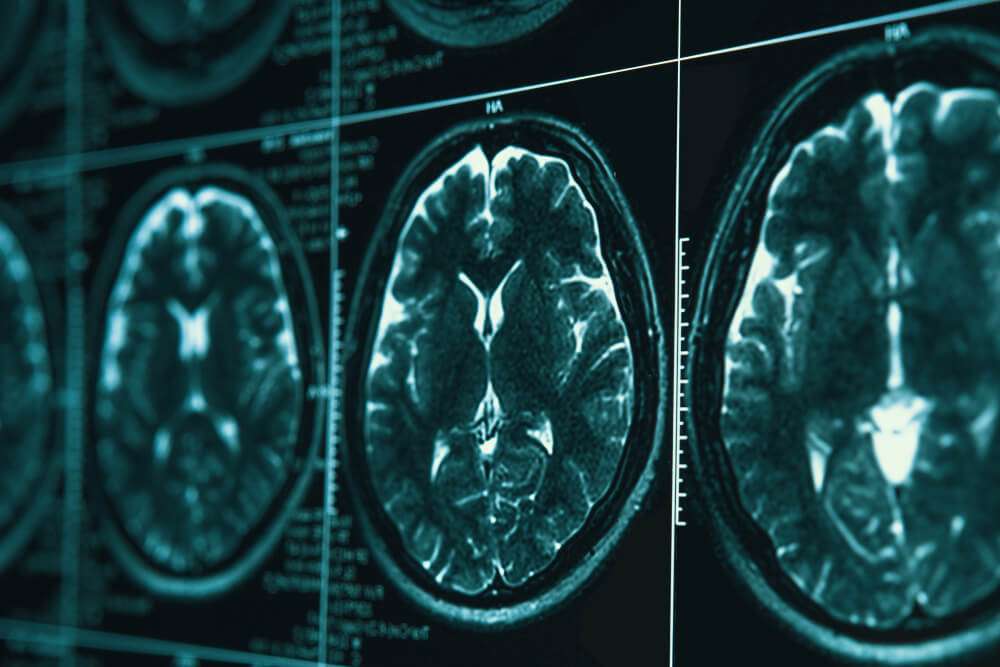
Preparing for a TBI Case
Preparation, preparation, and more preparation is key in any traumatic brain injury case. That goes for gathering evidence to understanding the nuances of personal injury law to everything in between. Each step is vital to building a solid case that will not only protect the victims of brain injuries, but will also ensure they are fairly compensated for their damages.
Gathering and Documenting Evidence
A successful (i.e., fair settlement or judgment) brain injury case often hinges on the quality and comprehensiveness of the evidence. That can include collecting medical records that detail the extent of the brain injury. For example, the medical report can give insight as to whether it’s a severe TBI, mild TBI, or a specific condition like axonal injury or brain bleed.
Further, on-scene evidence gathering can be just as important as the medical report. This can include:
- Getting eyewitness contact information and statement
- Taking photos and videos of the accident scene and aftermath
- Obtaining police reports
- Noting other variables that may have led to the accident
Medical Assessments and Expert Opinions
Medical assessments are essential when it comes to proving the extent of brain damage and its impact on the victim’s life. Top brain injury lawyers typically work with medical professionals (i.e., licensed physicians, therapists, etc.) to obtain the most accurate diagnoses and prognoses, which can be especially helpful in cases that involve diffuse axonal injuries or cerebral contusion. That’s because these types of brain injuries might not be immediately evident following accidents or sports injuries.
Navigating the Legal Process
Understanding and navigating the legal process is critical, to say the least. This includes, but isn’t limited to:
- Knowing all deadlines associated with your personal injury lawsuit
- Having an understanding of the statutes related to brain injury law, personal injury, malpractice, and more
- Bing prepared for potential court appearances
- Negotiating with insurance companies
A skilled traumatic brain injury attorney seamlessly guides victims of brain injury through these steps, ensuring no mistakes are made. A meticulously prepared brain injury law firm lays the groundwork for a strong legal case.
In doing so, they allow the victim to focus more on recovery, while their attorney handles the complexities of their personal injury case. Further, the better prepared your lawyer is during negotiations or court appearances, the more likely you are to get the outcome and compensation you deserve.
Choosing the Right Virginia Brain Injury Lawyer
Without the right head injury lawyers, your case will seem like an uphill battle from the beginning. However, when people and families who are impacted by traumatic brain injuries work with a skilled brain injury lawyer, their chances of success increase drastically. Continue reading to learn more about selecting the right legal advocate for your traumatic brain injury case.
Experience and Expertise in TBI Cases
When searching for the best brain injury lawyer, you should leave no stone unturned. That includes their experience and expertise in similar types of cases and their track record in handling complex cases involving severe TBI, diffuse axonal injuries, or cerebral contusions.
Not only will the right brain injuries lawyer have a deep understanding of brain injury law, but they’ll also tap into their network of professionals to ensure they cover every angle of the legal and medical aspects of the case.
Understanding the Client’s Needs
At the end of the day, your TBI attorney’s main job is to look out for the best interest of their clients. That starts with compassion. A good attorney for brain injury will honor the complexities of your case, the physical and emotional pain you’ve endured, and keep your unique needs at the top of mind. They should also provide crystal clear communication and support throughout the entire legal process.
Resources and Network of a TBI Law Firm
In many cases, your traumatic brain injury lawyer is only as good as the team they work with. That being said, the resources your brain injury law firm has at its disposal are incredibly important. A solid network might include medical experts, private investigators, and others. Before hiring an attorney, it’s in your best interest to be sure they have the resources to handle every scenario, from car accidents to medical malpractice.
Schedule A Free Consultation With a Virginia Brain Injury Lawyer
If you or a loved one suffer a traumatic brain injury due to the negligence or recklessness of another party, you need legal representation you can trust. Our brain injury attorneys are experienced, skilled, and ready to fight for the compensation you deserve. Don’t wait until it’s too late to get justice for what happened to you or a loved one.
“We Get Justice For Injured People In Court, and We Love What We Do”
We are not settlement lawyers. Sharif Gray has proven that he can and will get results in court, and the insurance companies know that. If you have suffered injuries because of someone else’s negligence, we can help.
Sharif is committed to trying cases well. Because of that, he does not handle hundreds of cases at a time. He is selective in the cases he takes so he can get justice for the people he represents. In every case, he has three goals:
- Hold the responsible corporation or individual fully accountable.
- Make the community safer, so others are not also harmed.
- Compensation that recognizes the full and fair value of what was taken from your health and quality of life.
We love what we do, and we are proud of the positive impact we have had and will continue to have on the people we represent and the community we live in.
If we can be of help to you, please do not hesitate to call us at (804) 915-1611 or contact us online to schedule a free consultation. We will get justice for you.
$10,000,000
Defendant, while racing on a residential road, crashed into an oncoming driver causing catastrophic injuries.
$9,000,000
Defendant failed to properly secure a display at its store which led to it falling on a child causing life altering injuries.
$1,500,000
Defendant failed to keep the entrance of its store safe for the public causing significant injuries.
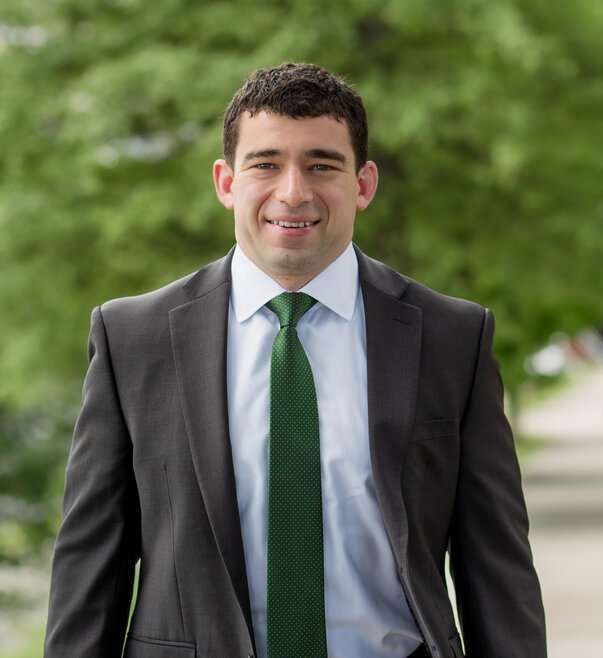
Contact Form
Car Accident Settlement: How Long Does It Take?
Top Reasons to Hire a Car Insurance Claim Lawyer After an Accident
Wrongful Death Claim Lawyer: Your Guide to Legal Action
What to Do After Being Hit by a Drunk Driver
Richmond Car Accident Lawyer: Get Help Now
Frequently Asked Questions
For answers specific to your case, please call Sharif Gray with Broughton Injury Law at (804) 915-1611, schedule a free consultation, or click the button below to send him a message.
The statute of limitations is two years for most personal injury, medical malpractice, and wrongful death cases in Virginia.
For most cases, you must file a lawsuit within that time frame. But there are exceptions (e.g., for minors).
Most personal injury cases settle without having to go to trial, but it depends on a number of things such as the strength of evidence, how willing the insurance company is to negotiate in good faith, and the client’s goals.
Even when a settlement is likely, it is best to prepare for trial, because a trial-ready case often leads to better settlements. That is why we prepare every case for trial, even though most cases settle.
In Virginia, the jury considers the following factors when deciding the amount of a verdict:
(1) Any bodily injuries sustained and their effect on health according to their degree and probable duration;
(2) Any physical pain and mental anguish suffered in the past and any that may be reasonably expected to suffer in the future;
(3) Any disfigurement or deformity and any associated humiliation or embarrassment suffered in the past and any that may be reasonably expected to suffer in the future;
(4) Any inconvenience caused in the past and any that probably will be caused in the future;
(5) Any medical expenses incurred in the past and any that may be reasonably expected to occur in the future;
(6) Any earnings lost because of being unable to work at their calling;
(7) Any loss of earnings and lessening of earning capacity, or either, that may reasonably be expected to sustain in the future; and
(8) Any property damage sustained.
Virginia Model Jury Instruction No. 9.000: General Personal Injury and Property Damage
There is no cap on damages in most personal injury cases. But there is a cap on damages in medical malpractice cases.
There is also a cap on punitive damages.
Your personal injury lawyer should pursue the full and fair value of what was taken from your health and quality of life.
Sharif Gray at Broughton Injury Law has won millions of dollars in verdicts and settlements, and he is known for taking cases to trial.
Sharif is not a settlement lawyer. He is committed to trying cases well. Because of that, he does not handle hundreds of cases at a time. He is selective in the cases he takes so he can get justice for the people he represents.
